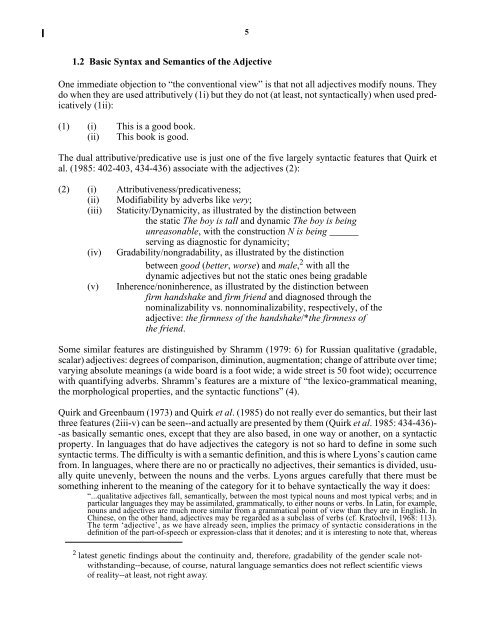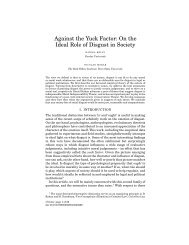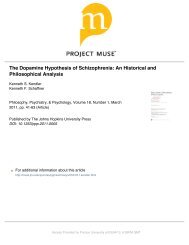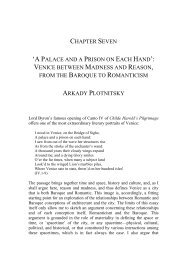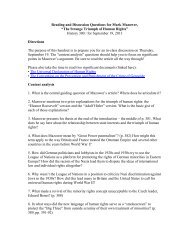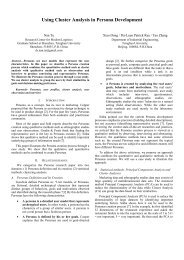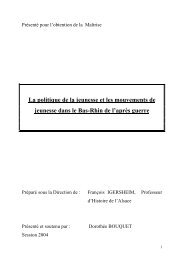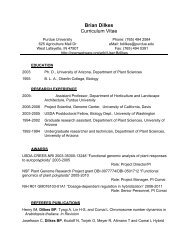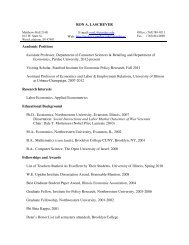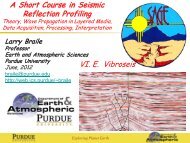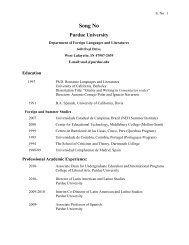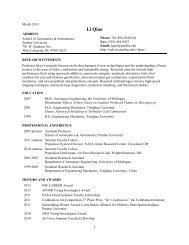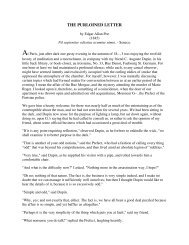Lexical Semantics of Adjectives - CiteSeerX
Lexical Semantics of Adjectives - CiteSeerX
Lexical Semantics of Adjectives - CiteSeerX
Create successful ePaper yourself
Turn your PDF publications into a flip-book with our unique Google optimized e-Paper software.
1.2 Basic Syntax and <strong>Semantics</strong> <strong>of</strong> the Adjective<br />
5<br />
One immediate objection to “the conventional view” is that not all adjectives modify nouns. They<br />
do when they are used attributively (1i) but they do not (at least, not syntactically) when used predicatively<br />
(1ii):<br />
(1) (i) This is a good book.<br />
(ii) This book is good.<br />
The dual attributive/predicative use is just one <strong>of</strong> the five largely syntactic features that Quirk et<br />
al. (1985: 402-403, 434-436) associate with the adjectives (2):<br />
(2) (i) Attributiveness/predicativeness;<br />
(ii) Modifiability by adverbs like very;<br />
(iii) Staticity/Dynamicity, as illustrated by the distinction between<br />
the static The boy is tall and dynamic The boy is being<br />
unreasonable, with the construction N is being ______<br />
serving as diagnostic for dynamicity;<br />
(iv) Gradability/nongradability, as illustrated by the distinction<br />
between good (better, worse) and male, 2 with all the<br />
dynamic adjectives but not the static ones being gradable<br />
(v) Inherence/noninherence, as illustrated by the distinction between<br />
firm handshake and firm friend and diagnosed through the<br />
nominalizability vs. nonnominalizability, respectively, <strong>of</strong> the<br />
adjective: the firmness <strong>of</strong> the handshake/*the firmness <strong>of</strong><br />
the friend.<br />
Some similar features are distinguished by Shramm (1979: 6) for Russian qualitative (gradable,<br />
scalar) adjectives: degrees <strong>of</strong> comparison, diminution, augmentation; change <strong>of</strong> attribute over time;<br />
varying absolute meanings (a wide board is a foot wide; a wide street is 50 foot wide); occurrence<br />
with quantifying adverbs. Shramm’s features are a mixture <strong>of</strong> “the lexico-grammatical meaning,<br />
the morphological properties, and the syntactic functions” (4).<br />
Quirk and Greenbaum (1973) and Quirk et al. (1985) do not really ever do semantics, but their last<br />
three features (2iii-v) can be seen--and actually are presented by them (Quirk et al. 1985: 434-436)-<br />
-as basically semantic ones, except that they are also based, in one way or another, on a syntactic<br />
property. In languages that do have adjectives the category is not so hard to define in some such<br />
syntactic terms. The difficulty is with a semantic definition, and this is where Lyons’s caution came<br />
from. In languages, where there are no or practically no adjectives, their semantics is divided, usually<br />
quite unevenly, between the nouns and the verbs. Lyons argues carefully that there must be<br />
something inherent to the meaning <strong>of</strong> the category for it to behave syntactically the way it does:<br />
“...qualitative adjectives fall, semantically, between the most typical nouns and most typical verbs; and in<br />
particular languages they may be assimilated, grammatically, to either nouns or verbs. In Latin, for example,<br />
nouns and adjectives are much more similar from a grammatical point <strong>of</strong> view than they are in English. In<br />
Chinese, on the other hand, adjectives may be regarded as a subclass <strong>of</strong> verbs (cf. Kratochvíl, 1968: 113).<br />
The term ‘adjective’, as we have already seen, implies the primacy <strong>of</strong> syntactic considerations in the<br />
definition <strong>of</strong> the part-<strong>of</strong>-speech or expression-class that it denotes; and it is interesting to note that, whereas<br />
2<br />
latest genetic findings about the continuity and, therefore, gradability <strong>of</strong> the gender scale notwithstanding--because,<br />
<strong>of</strong> course, natural language semantics does not reflect scientific views<br />
<strong>of</strong> reality--at least, not right away.


